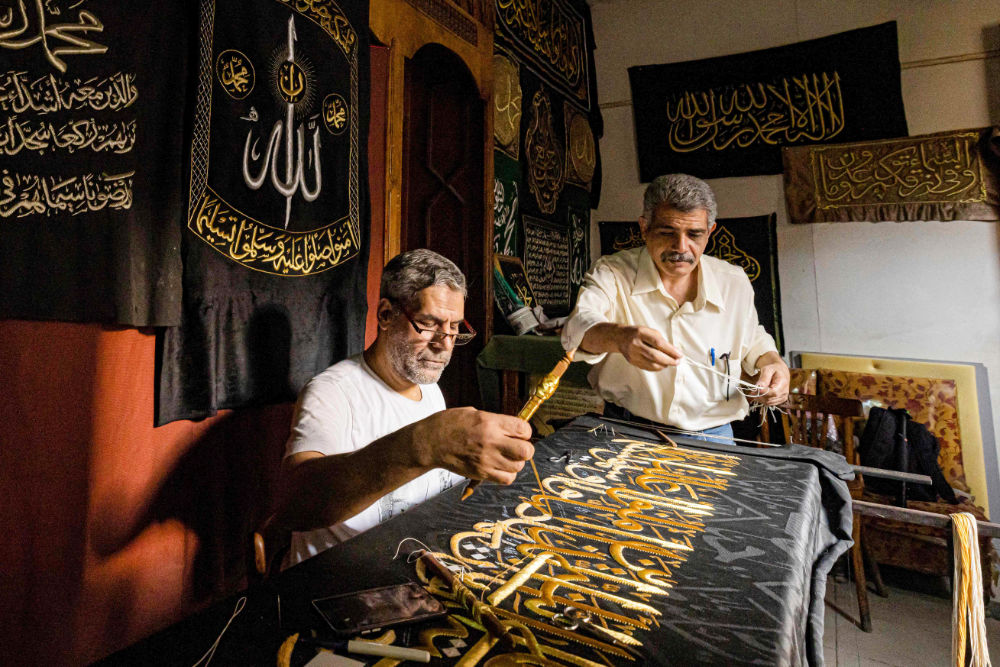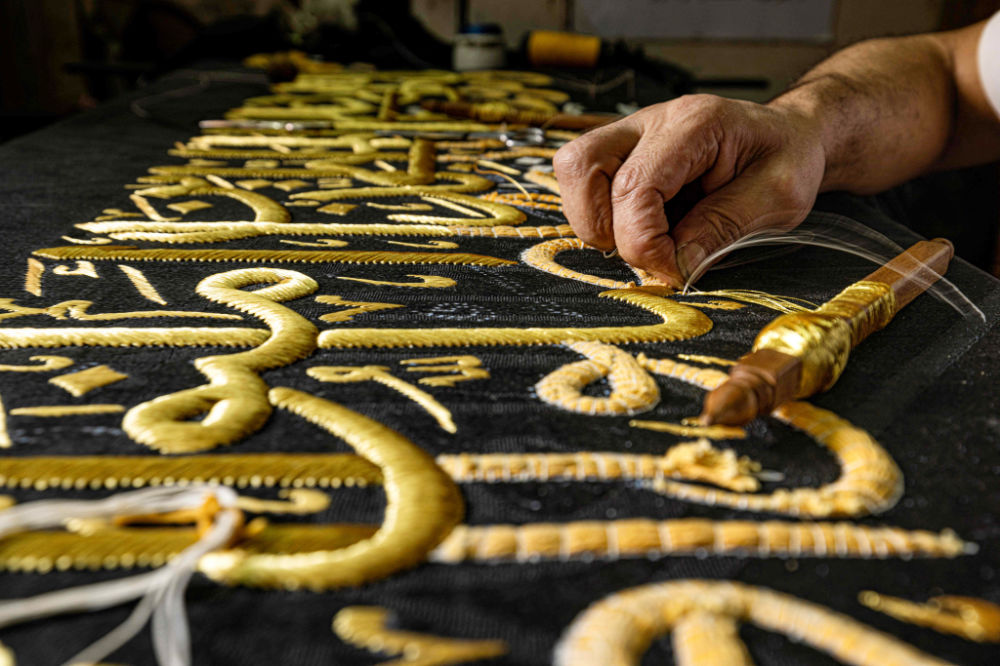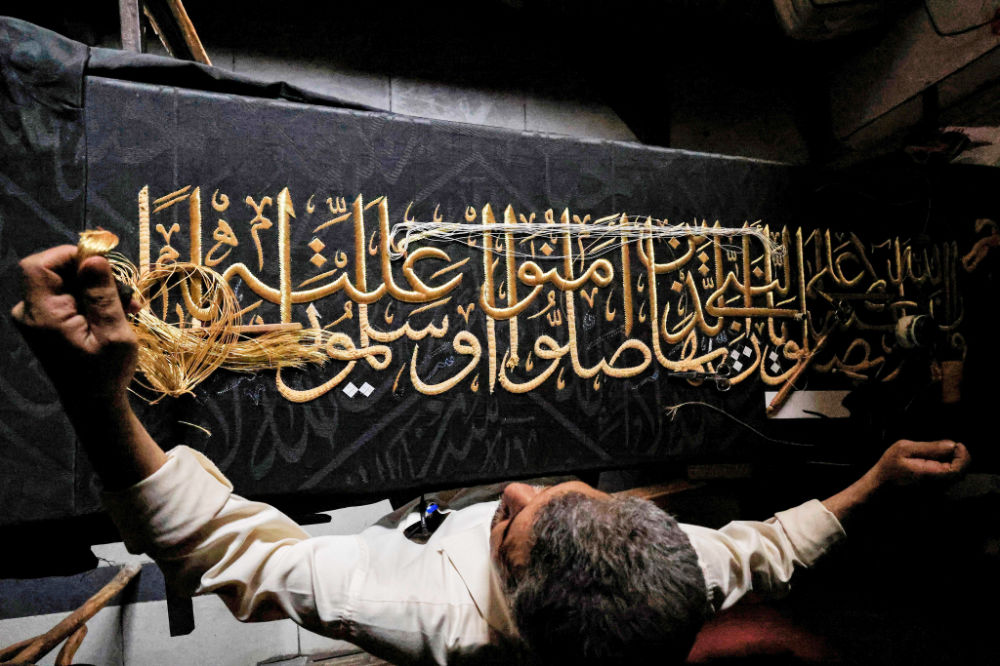CAIRO, Egypt: Under the steady hum of a ceiling fan, Ahmed Othman weaves golden threads through black fabric, creating Qur'anic verses, a century after his grandfather’s work adorned the Kaaba in Makkah’s Grand Mosque.
A ceremonial hanging of the kiswa, huge pieces of black silk embroidered with gold patterns, over the cubic structure that is the centerpiece of the Grand Mosque symbolizes the launch of the Hajj annual pilgrimage, which starts this week.

In this file photo taken on April 4, 2021 the keys of the Kaaba (box), Islam's holiest shrine at the Grand Mosque in Makkah, and a fragment of the black-clothed Kiswa (wall) which is used to cover the Kaaba, the final one provided by Egypt (in 1961) during the administration of President Gamal Abdel Nasser, are displayed at the Museum of Egyptian Civilisation (NMEC), in the Fustat district of Old Cairo. (AFP)
Othman’s family used to be honored with the task of producing the kiswa.
His family’s creations would be despatched in a camel caravan to Islam’s holiest site in western Saudi Arabia toward which Muslims across the world turn to pray.
Now, Othman keeps the tradition alive in a small workshop, tucked above the labyrinthine Khan Al-Khalili bazaar in central Cairo, where mass-produced souvenirs line the alleys.
The area is historically home to Egypt’s traditional handicrafts, but artisans face growing challenges.

Egyptian embroiderer Ahmed Othman el-Kassabgy (R), whose family was traditionally responsible for used to be honoured with the task of producing the Kiswa, the cloth used to cover the Kaaba at the Grand Mosque in the Muslim holy city of Makkah, supervises as another employee (L) sews with gold thread a verse from the Holy Koran, Islam's holy book, onto a replica drape to be sold as a souvenir for tourists visiting the historic district of al-Hussein of Islamic Cairo in Egypt's capital on June 15, 2022. (AFP)
Materials, mostly imported, have become expensive, particularly as Egypt faces economic woes and a devalued currency.
Plummeting purchasing power makes high quality hand-crafted goods inaccessible to the average Egyptian, while master craftspeople find it hard to hand down their skills as young people turn to more lucrative jobs.
This wouldn’t be the case “if there was good money in the craft,” Othman sighed, hunched over one of the many tapestries that fill his workshop.
Sheets of black and brown felt are covered in verses and prayers, delicately embroidered in silver and gold.
Every stitch echoes the “sacred ritual” Othman’s grandfather was entrusted with in 1924.
“For a whole year, 10 craftsmen” would work on the kiswa that covers the Kaaba which pilgrims circumambulate, using silver thread in a lengthy labor of love.

An embroiderer sews with gold thread a verse from the Holy Koran, Islam's holy book, onto a replica of the Kiswa, the cloth used to cover the Kaaba at the Grand Mosque in the Muslim holy city of Makkah, to be sold as a souvenir for tourists visiting the historic district of al-Hussein of Islamic Cairo in Egypt's capital on June 15, 2022. (AFP)
From the 13th century, Egyptian artisans made the giant cloth in sections, which authorities transported to Makkah with great ceremony.
Celebrations would mark the processions through cities, flanked by guards and clergymen as Egyptians sprinkled rosewater from balconies above.
Othman’s grandfather, Othman Abdelhamid, was the last to supervise a fully Egyptian-made kiswa in 1926.
From 1927, manufacturing began to move to Makkah in the nascent Kingdom of Saudi Arabia, which would fully take over production of the kiswa in 1962.
The family went on to embroider military regalia for Egyptian and foreign dignitaries, including former presidents Gamal Abdel Nasser and Anwar Sadat.
“In addition to our work with military rank embroideries, my father started embroidering Qur'anic verses on tapestries,” and then reproducing whole sections of the kiswa.
Clients began flooding in for “exact replicas of the kiswa, down to the last detail.”

Egyptian embroiderer Ahmed Othman el-Kassabgy, whose family was traditionally responsible for used to be honoured with the task of producing the Kiswa, the cloth used to cover the Kaaba at the Grand Mosque in the Muslim holy city of Makkah, sews with gold thread a verse from the Holy Koran, Islam's holy book, onto a replica drape to be sold as a souvenir for tourists visiting the historic district of al-Hussein of Islamic Cairo in Egypt's capital on June 15, 2022. (AFP)
Though today they offer small tableaus for as little as 100 Egyptian pounds (about $5), massive customised orders go for several thousand dollars, such as replicas of the Kaaba door, which Othman proudly claims are indistinguishable from the originals in Makkah.
But the family has not been immune to the economic turbulence that began with the coronavirus pandemic, which decimated small businesses and craftsmanship in Egypt.
Since early 2020, they have sold around “two pieces per month,” whereas before they would sell at least one tapestry a day.
Othman worries that a sense of “worldwide austerity” makes business unlikely to bounce back.
Today, there might only be a dozen or so craftsmen whose work he considers authentic, with many artisans leaving the craft for quicker cash flows.
“They can make 200 to 300 pounds a day,” ($10-$16) driving a tuktuk motorized rickshaw, or a minibus, Othman said. “They’re not going to sit on a loom breaking their backs all day.”
But still, a century and a half after his great grandfather left his native Turkey and brought the craft with him to Egypt, Othman says he has stayed loyal to techniques learnt as a child when he would duck out of school to watch his father work.
“It’s on us to uphold the craft the same way we learned it, so it’s authentic to the legacy we inherited,” he said.
























